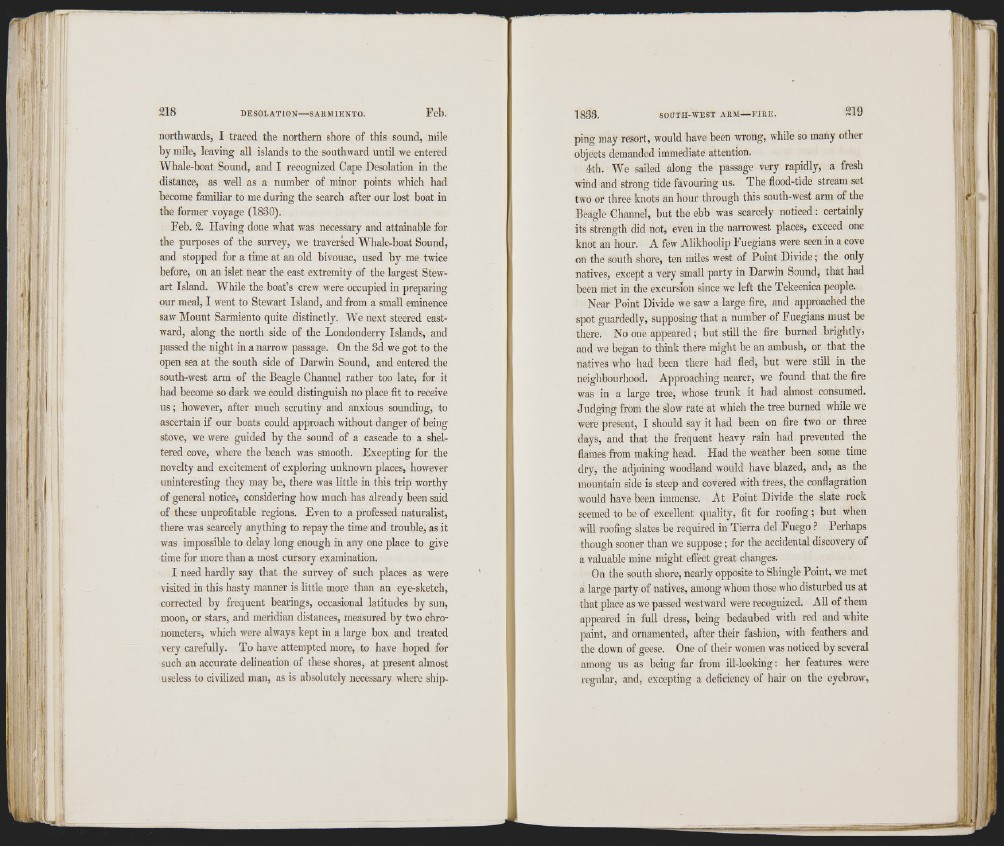
*; I í ■ i
' : j-, ih
ii] ' ;;
'; st 5 -:r :
Í;í
• 'I
:Í
i. ¡ 11
northwards, I traced the northern shore of this sound, mile
by mile, leaving all islands to the southward until we entered
Whale-boat Sound, and I recognized Cape Desolation in the
distance, as well as a number of minor points which had
become familiar to me during the search after our lost boat in
the former voyage (1830).
Feb. 2. Having done what was necessary and attainable for
the purpo.ses of the survey, we traversed Whale-boat Sound,
and stopped for a time at an old bivouac, used by me twice
before, on an islet near the east extremity of the largest Stewart
Island. While the boat’s crew were occupied in preparing
our meal, I went to Stewart Island, and from a small eminence
saw Mount Sarmiento quite distinctly. We next steered eastward,
along the north side of the Londonderry Islands, and
passed the night in a narrow passage. On the 3d we got to the
open sea at the south side of Darwin Sound, and entered the
south-west arm of the Beagle Channel rather too late, for it
had become so dark we could distinguish no place fit to receive
u s ; however, after much scrutiny and anxious sounding, to
ascertain if our boats could approach without danger of being
stove, we were guided by the sound of a cascade to a sheltered
cove, where the beach was smooth. Fxcepting for the
novelty and excitement of exploring unknown places, however
uninteresting they may be, there was little in this trip worthy
of general notice, considering how much has already been said
of these unprofitable regions. Even to a professed naturalist,
there was scarcely anything to repay the time and trouble, as it
was impossible to delay long enough in any one place to give
time for more than a most cursory examination.
I need hardly say that the survey of such places as were
visited in this hasty manner is little more than an eye-sketch,
corrected by frequent bearings, occasional latitudes by sun,
moon, or stars, and meridian distances, measured by two chronometers,
which were always kept in a large box and ti'eated
very carefully. To have attempted more, to have hoped for
such an accurate delineation of these shores, at present almost
useless to civilized man, as is absolutely necessary where shipping
may resort, would have been wrong, while so many other
objects demanded immediate attention.
4th. We sailed along the passage very rapidly, a fresh
wind and strong tide favouring us. The flood-tide stream set
two or three knots an hour through this south-west arm of the
Beagle Channel, but the ebb was scarcely noticed : certainly
its strength did not, even in the narrowest places, exceed one
knot an hour. A few Alikhoolip Fuegians were seen in a cove
on the south shore, ten miles west of Point Divide; the only
natives, except a very small party in Darwin Sound, that had
been met in the excursion since we left the Tekeenica people.
Near Point Divide we saw a large fire, and approached the
spot guardedly, supposing that a number of Fuegians must be
there. No one appeared; but still the fire burned brightly?
and we began to think there might he an ambush, or that the
natives who had been there had fled, hut were still in the
neighbourhood. Approaching nearer, we found that the fire
was in a large tree, whose trunk it had almost consumed.
Judging from the slow rate at which the tree burned while we
were present, I should say it had been on fire two or three
days, and that the frequent heavy rain had prevented the
flames from making head. Had the weather been some time
dry, the adjoining woodland would have blazed, and, as the
mountain side is steep and covered with trees, the conflagration
would have been immense. At Point Divide the slate rock
seemed to be of excellent quality, fit for roofing ; but when
will roofing slates be required in Tierra del Fuego ? Perhaps
though sooner than we suppose ; for the accidental discovery of
a valuable mine might eflect great changes.
On the south shore, nearly opposite to Shingle Point, we met
a lai'ge party of natives, among whom those who disturbed us at
that place as we passed westward were recognized. AU of them
appeared in full dress, being bedaubed with red and white
paint, and ornamented, after their fashion, with feathers and
the down of geese. One of their women was noticed by several
among us as being far from ill-looking: her features were
regular, and, excepting a deficiency of hair on the eyebrow.